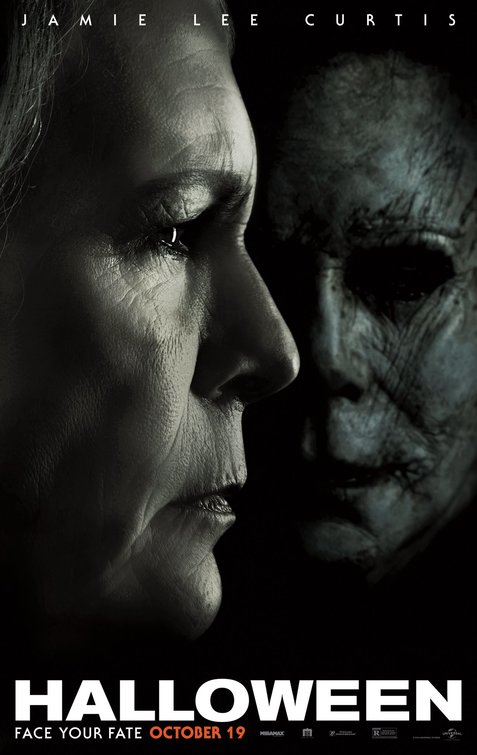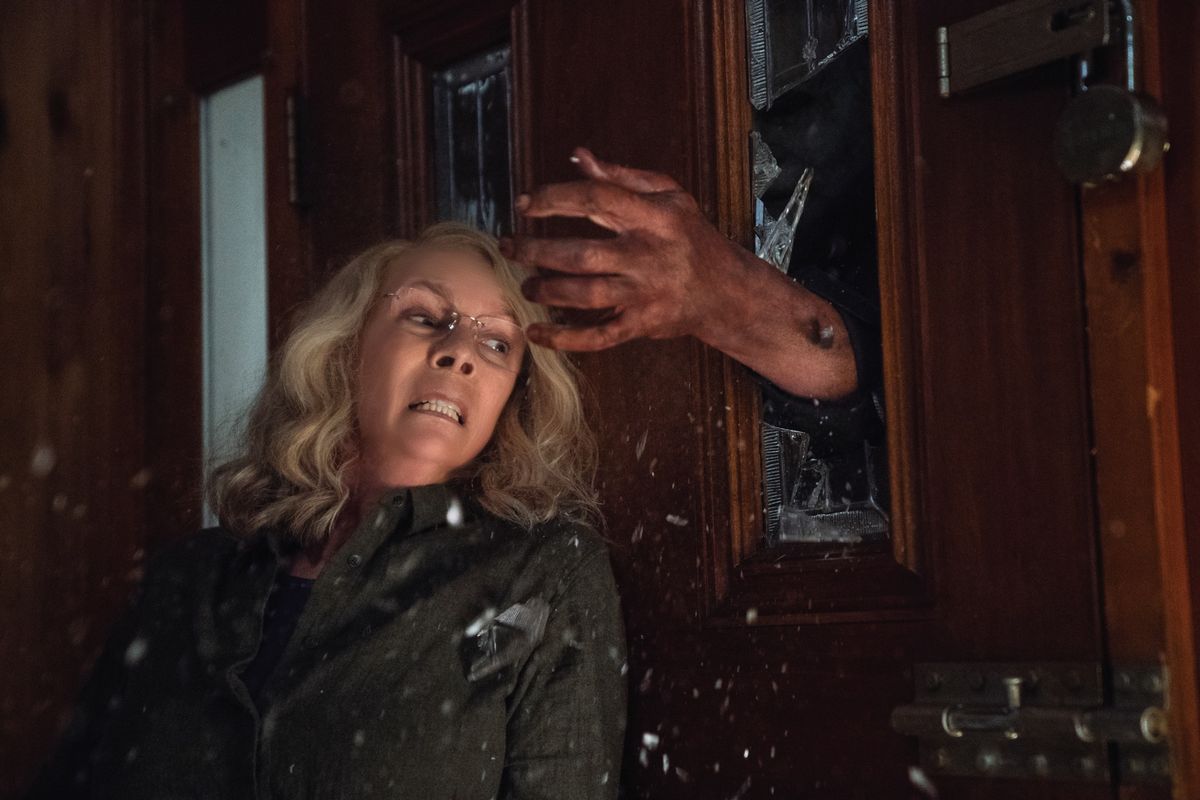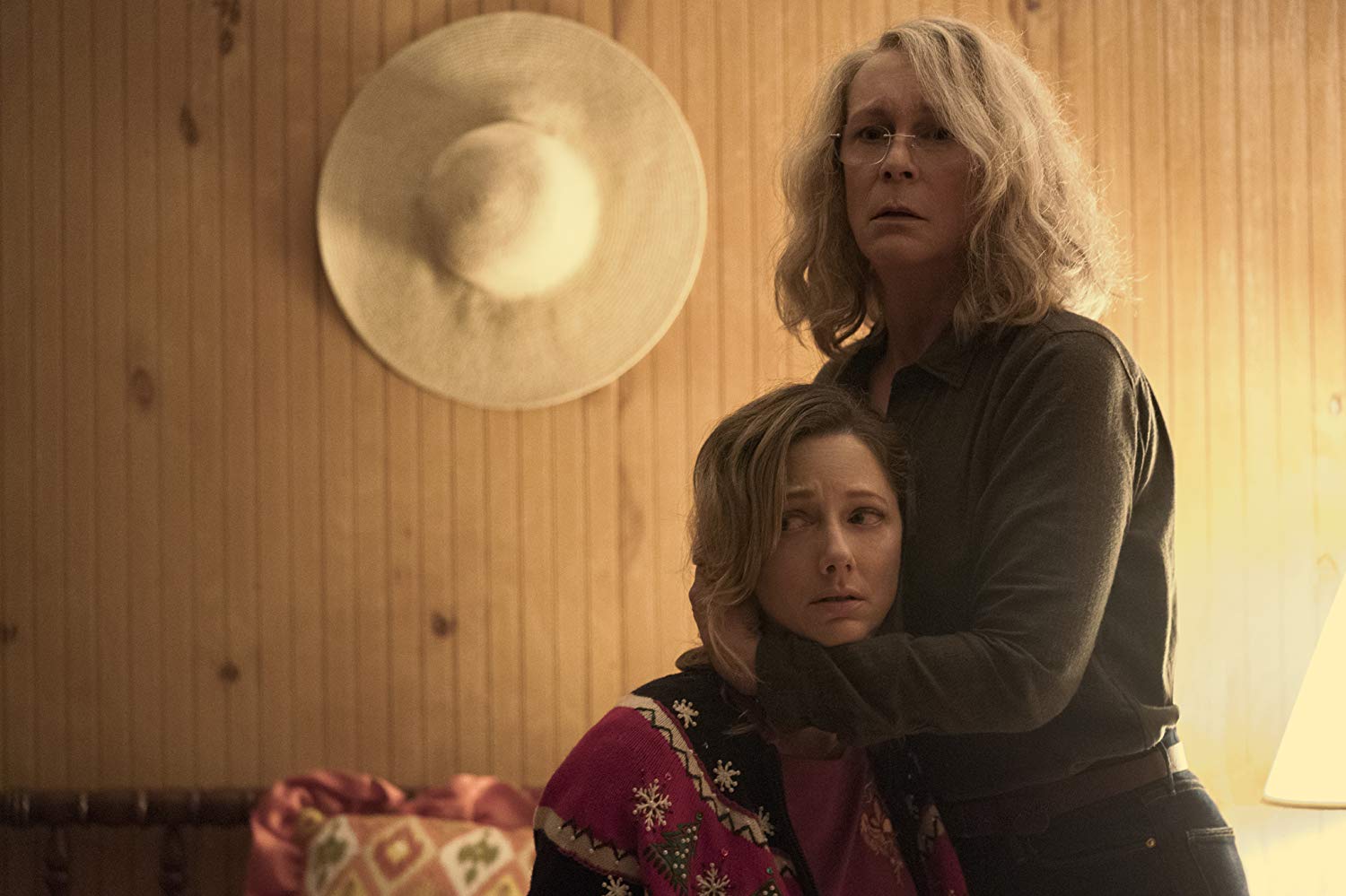by Chris Feil
 After being reinterpreted by Rob Zombie in two grittier takes, Michael Myers returns to Haddonfield and to his storytelling roots in David Gordon Green’s Halloween. And even more importantly, so is his first survivor Laurie Strode and the indomitable woman that plays her: Jamie Lee Curtis.
After being reinterpreted by Rob Zombie in two grittier takes, Michael Myers returns to Haddonfield and to his storytelling roots in David Gordon Green’s Halloween. And even more importantly, so is his first survivor Laurie Strode and the indomitable woman that plays her: Jamie Lee Curtis.
This take unfurls the fortieth anniversary of the original John Carpenter film (dispensing with the narrative of all other installments) as the septuagenarian Michael escapes his asylum confines to return home and kill again. But this time Laurie is ready, perhaps too ready. She’s been waiting actually, devoting her life to preparing for his inevitable return by outfitting her home with intricate safety mechanisms and a cache of guns. The fallout has been isolating herself in a constant thrum of anxiety and becoming estranged from her daughter, played by Judy Greer. Michael’s return puts him and Laurie on their fated trajectory, this time with Laurie’s granddaughter (and the fate of her family’s survival) in the middle.

Admirably, this Halloween attempts to create a fabric of ideas where the simplicity of “good versus evil” unleashes a torrent of thoughts much harder to reconcile. Lived traumas can become inherited, passed down as indoctrinated survival tactics. Crime legends are newly perpetuated through the often gross omnipresence and digestibility of true crime media (now in podcast form!). Michael’s indistinctness without his mask contradicts that his serial killer costume is terrifying partly because it is nondescript; he has chosen what could be described as “everyday man” to literally mask his otherworldly psychosis, his version of assimilation is annihilation. The world continually begs to hear him speak, but tries to tell Laurie what her own story is.
Yet each of these fascinating insights are merely noted before the film frustratingly discards them for either more mayhem or another notion it doesn’t develop. What could be thematic world-building, with all of these things floating in its ether, becomes half-baked as it almost immediately loses interest in all of them. Halloween would rather throw as many things at the wall as it can, but we care more than it does about whether or not they stick.
The idea it gleans to most fully is that of the lingering trauma endured by Laurie Strode, how it has rematerialized across generations of daughters and how she reclaims it. But unfortunately this feels largely beyond the depth of Green and his cowriting partners Danny McBride and Jeff Fradley. Luckily, we have Jamie Lee Curtis’ hand taking the reins in her journey, giving her complexity where they have tried to pin her into cliched corners. She’s not provided enough room to feel fully like an authorial voice, but it’s damn close. She doesn’t just save herself, she saves the movie.

Much of the payoff comes from repurposing key imagery from the original (excluding one misfire that is ruined purely through poor staging and clunky CGI) to turn the tables on Michael. The finale of the film is satisfying in the extreme, as primal and exacting as we wish the film entire would have been. When so many franchise films these days - superhero ones especially - feel obstructed by the demands of fan service, Halloween is liberated by it. Sure, this one sometimes takes it to the point of feeling like outright fan fiction, but it can be excused for finally taking it back to Laurie as she is and always was. You know, a superhero.
But so much reverence to the original in all of its tension building tactics and understated visual panache unfortunately only invites qualitative comparisons between the two when this one’s attempts at mimicry miss the mark. Despite all of its evident affection, much of this also serves to show the many ways that Green is ill-fitted to the material.
The director has been adaptable to sometimes anonymous effect, jostling raucousness like Pineapple Express and the intimacy of films like All The Real Girls. Here he seems caught between all of his traits, missing on his best ones as the result. Though rewriting the rules and history is par for the course with this franchise in particular, Green seems confused on the things that distinguish Michael Myers’ menace, developing cognizance and performative traits that don’t sync with how he is defined. At best, he’s an efficient guide for the material, but at worst we can’t avoid the question if he’s the person to be telling this story.
While it’s not nearly the return to the peak form for the franchise, it does satisfy on Laurie’s terms. It’s not just a joy to see Jamie Lee Curtis on screen again, it’s that she gets to run away with the film in ways she has rarely been afforded. In her hands, the somewhat rote slasher mechanics of the film become essential.
Grade: C (Finale: B, Jamie Lee Curtis: B+)